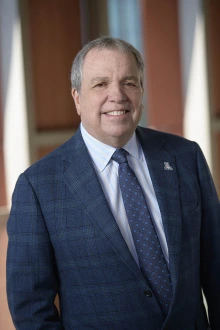New UArizona Health Sciences Center for Advanced Molecular and Immunological Therapies in Phoenix Guided by Diverse Group of Experts
Health Sciences senior vice president Michael D. Dake, MD, to discuss development of Arizona’s newest biomedical research hub at public forum.

Distinguished leaders in academic research, biomedical and health care industries, government organizations and corporations across the state will help guide the development of the University of Arizona Health Sciences Center for Advanced Molecular and Immunological Therapies.
The recently announced University of Arizona Health Sciences Center for Advanced Molecular and Immunological Therapies, known as CAMI, has garnered the support and involvement of more than 20 leaders in academic research, biomedical and health care industries, government organizations and corporations across the state.

Michael D. Dake, MD, is senior vice president for the University of Arizona Health Sciences.
The experts in their respective fields are members of the CAMI advisory committee, working in one of three targeted areas: Leadership and Organization; Program and Development; and Space, Design and Construction.
“The University of Arizona Health Sciences has unique expertise in basic science, translational medicine and investigator-led clinical trials that will allow us to lead the nation in advanced immunotherapies research and the pursuit of innovative treatments,” said Michael D. Dake, MD, senior vice president of the University of Arizona Health Sciences. “Each of the advisory committee members are leaders in their respective fields, and their contributions will help ensure the success of the Center for Advanced Molecular and Immunological Therapies.”
The CAMI advisory committee members are:
Leadership and Organization
- Deepta Bhattacharya, PhD, professor, Department of Immunobiology, College of Medicine – Tucson, BIO5 Institute member
- Richard Carmona, MD, MPH, FACS, distinguished laureate professor, Mel and Enid Zuckerman College of Public Health
- Kate Gallego, MBA, mayor, City of Phoenix
- Eric Reiman, MD, executive director, Banner Alzheimer’s Institute, director, Arizona Alzheimer’s Consortium, CEO, Banner Research, clinical director of the Neurogenomics Division, Translational Genomics Research Institute, BIO5 Institute member
- Rachna Shroff, MD, MS, associate professor, Department of Medicine; chief, Division of GI Medical Oncology, College of Medicine – Tucson; director, Arizona Clinical Trials Network, UArizona Cancer Center, BIO5 Institute member
- Brad Vynalek, JD, partner and firm president, Quarles & Brady
Program and Development
- Cara Christ, MD, MS, chief medical officer, Arizona Blue Cross Blue Shield
- Karen Taraszka Hastings, MD, PhD, FAAD, associate professor, Department of Basic Medical Sciences and co-director, MD/PhD program, College of Medicine – Phoenix
- Emmanuel Katsanis, MD, professor of pediatrics, College of Medicine – Tucson, and member of the UArizona Cancer Center, the Steele Children’s Research Center and the BIO5 Institute
- Michael Kuhns, PhD, associate professor, Department of Immunobiology, College of Medicine – Tucson; BIO5 Institute member
- Mike Lee, BS, founding partner of Redmile Group, LLC
- Timothy Marlowe, PhD, assistant professor, Internal Medicine, director, Molecular Discovery Core, College of Medicine – Phoenix
- George Poste, DVM, PhD, DSc, FRC Path, F Med Sci, CBE, FRS, Regents’ Professor and Del E. Webb Chair in Health Innovation, Arizona State University; chief scientist, Complex Adaptive Systems
- Nathaniel Soper, MD, FACS, MAMES, chair, Department of Surgery, College of Medicine – Phoenix; Physician Executive Director, General Surgery Service Line, Banner University Medical Center – Phoenix
- Joann Sweasy, PhD, director, UArizona Cancer Center, Nancy C. and Craig M. Berge Endowed Chair for the Director of the Cancer Center
- Frederic Zenhausern, PhD, MBA, endowed chair professor and interim co-chair of the Department of Basic Medical Sciences at the College of Medicine – Phoenix, BIO5 Institute member
Space, Design and Construction
- Christopher Glembotski, PhD, professor, Department of Internal Medicine; associate dean of research, College of Medicine – Phoenix; director, Translational Cardiovascular Research Center, BIO5 Institute member
- Ken Knox, MD, professor, Department of Internal Medicine; associate dean of faculty affairs-development; research director, Lung Institute, College of Medicine – Phoenix
- Janko Nikolich-Žugich, MD, PhD, head and professor, Department of Immunobiology, College of Medicine – Tucson, co-director Arizona Center on Aging; director, Aegis Consortium; BIO5 Institute member
- Jim Rounds, MS, president, Rounds Consulting Group, Inc.
- Jason A. Wertheim, MD, PhD, vice dean of research and graduate studies; associate professor, Department of Surgery, College of Medicine – Tucson
- Michael Worobey, PhD, head and professor, Department of Ecology and Evolutionary Biology, UArizona College of Science, BIO5 Institute member
Dr. Dake gave a presentation about CAMI as part of UArizona Health Sciences’ Tomorrow is Here Lecture Series on May 17 at the Phoenix Bioscience Core campus. The presentation, “Precision Health Care for All: The University of Arizona Health Sciences Center for Advanced Molecular and Immunological Therapies,” can be viewed online.
CAMI will serve as the anchor for an innovation district that aims to differentiate Phoenix from other emerging life sciences hubs, establishing the Phoenix Bioscience Core as a center of cell and gene therapy research, startup activity and corporate engagement. The center’s location in Phoenix is expected to facilitate strong connections with partners such as Arizona State University, Northern Arizona University, the Mayo Clinic and the Translational Genomics Research Institute, while boosting the local economy in the process.
Contact
Margarita Bauzá
313-520-2109
mbauza@arizona.edu

